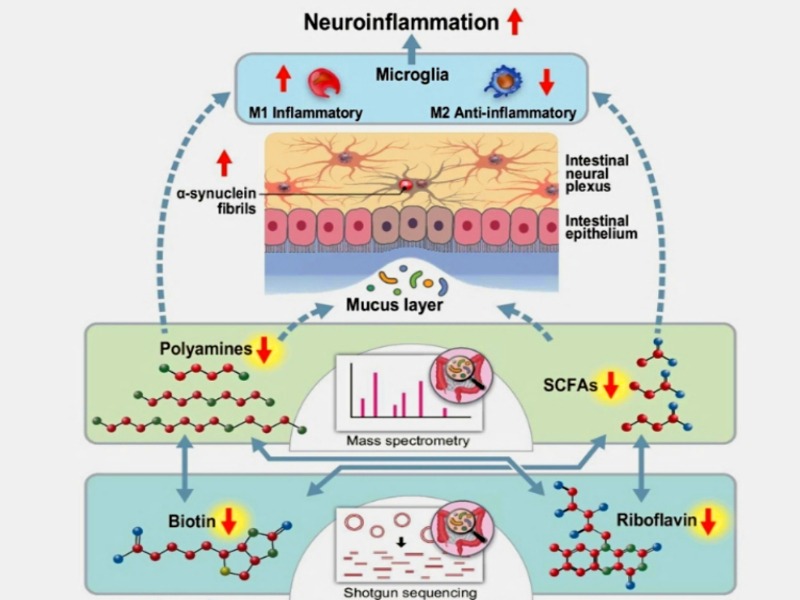Table of Contents
- Why Polyamines and SCFAs Matter for Gut Health
- The Link Between B Vitamins and Gut Health
- How Leaky Gut Affects Overall Health
- Neurological and Systemic Implications of a Compromised Gut
- Strategies to Support Gut Health
- Conclusion: Prioritizing Gut Health to Prevent Disease
Gut health is the foundation of overall well-being, and molecules like polyamines and short-chain fatty acids (SCFAs) play a pivotal role in maintaining the integrity of the intestinal mucus layer. Deficiencies in these compounds, often linked to a lack of key B vitamins such as biotin and riboflavin, can lead to leaky gut syndrome, increased intestinal permeability, and a host of health complications. Understanding the connection between these nutrients and gut health is vital for protecting the gut-brain axis and reducing the risks of neurodegenerative diseases like Parkinson’s.
Why Polyamines and SCFAs Matter for Gut Health
Polyamines and SCFAs: Key Guardians of the Gut
Polyamines (e.g., spermidine and spermine) are small molecules that support cell growth, repair, and tissue regeneration. SCFAs, including butyrate, acetate, and propionate, are produced when gut bacteria ferment dietary fibers. Together, they maintain the intestinal mucus layer, a crucial barrier that shields gut tissues and the enteric nervous system.
When levels of polyamines and SCFAs decline:
- The mucus layer thins, reducing its protective function.
- Gaps form between intestinal cells, increasing permeability.
- This condition, commonly called leaky gut syndrome, allows harmful toxins, bacteria, and chemicals to enter the bloodstream.
The Link Between B Vitamins and Gut Health
Biotin and Riboflavin: Essential for SCFA Production
B vitamins, particularly biotin, and riboflavin, are vital for supporting SCFA-producing gut bacteria. They act as cofactors in microbial metabolism, promoting the synthesis of SCFAs and polyamines that strengthen the gut barrier.
Deficiencies in these vitamins disrupt this balance, resulting in:
- Reduced SCFA production.
- Impaired mucus synthesis.
- Compromised gut integrity, making it more vulnerable to environmental toxins.
How Leaky Gut Affects Overall Health
Elevated Zonulin and Intestinal Permeability
Zonulin is a protein that regulates the tight junctions between epithelial cells. When zonulin levels rise due to a weakened gut barrier:
- The tight junctions loosen, increasing intestinal permeability.
- Harmful substances like pesticides, herbicides, and cleaning chemicals infiltrate the gut and bloodstream.
Toxic Exposure and α-Synuclein Fibril Formation
Exposure to environmental toxins in the gut triggers the overproduction of α-synuclein, a protein associated with neurodegenerative diseases like Parkinson’s. Misfolded α-synuclein fibrils travel via the vagus nerve from the gut to the brain, fueling neuroinflammation and neuronal damage.
Neurological and Systemic Implications of a Compromised Gut
1. Neurological Disorders:
- Increased α-synuclein production may contribute to Parkinson’s disease.
- Disrupted gut-brain communication through the vagus nerve can exacerbate mental health conditions.
2. Chronic Inflammation:
- Bacterial endotoxins like lipopolysaccharides (LPS) enter circulation, triggering systemic inflammation.
- This inflammation is linked to autoimmune and metabolic diseases.
3. Microbiota Imbalance:
- A loss of SCFA-producing bacteria disrupts the microbiome’s balance, which is essential for immunity, mood regulation, and neurological health.
Strategies to Support Gut Health
Boost Polyamine and SCFA Production
- Include fiber-rich foods like whole grains, fruits, and vegetables to fuel SCFA-producing bacteria.
- Add polyamine-rich foods, such as aged cheese, soybeans, mushrooms, and legumes, to your diet.
Prioritize B Vitamin Intake
- Ensure adequate consumption of biotin and riboflavin from eggs, dairy products, leafy greens, and fortified foods.
- Consider supplements if dietary intake is insufficient.
Protect Against Environmental Toxins
- Choose organic produce to reduce exposure to pesticides and herbicides.
- Use natural, chemical-free cleaning products in your home.
Incorporate Probiotics and Prebiotics
- Probiotics, like those found in yogurt or supplements, help restore beneficial gut bacteria.
- Prebiotics, such as inulin and resistant starch, provide food for SCFA-producing bacteria.
Manage Stress
- Chronic stress weakens the gut barrier. To support gut health, practice mindfulness, exercise regularly, and get adequate sleep.
Conclusion: Prioritizing Gut Health to Prevent Disease
Deficiencies in polyamines, SCFAs, and B vitamins compromise the intestinal mucus layer, making the gut more susceptible to toxins and triggering systemic health issues. By maintaining adequate levels of these nutrients through dietary and lifestyle adjustments, you can strengthen the gut barrier, reduce inflammation, and support the gut-brain axis, ultimately lowering the risk of neurological and systemic diseases.
Taking care of your gut is an investment in your overall health and well-being.
Nootropics for Motivation, Focus, Memory, and Stress Resilience
The main image is used with grateful acknowledgment to (Nishiwaki et al., npj Parkinson’s Disease, 2024)
